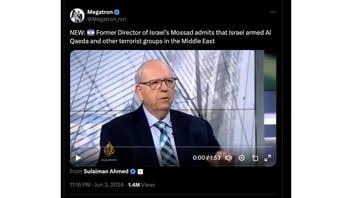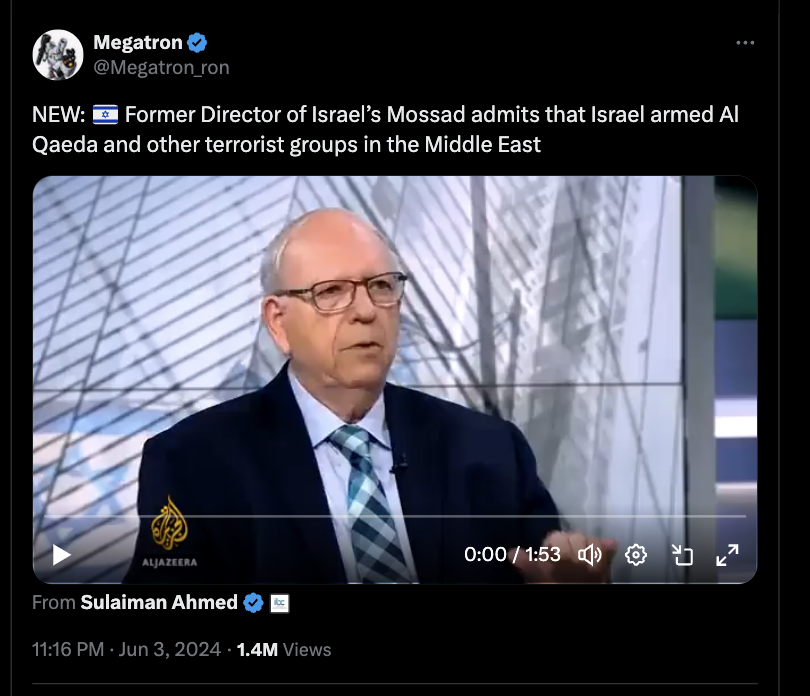
Did former Mossad director Efraim Halevy say in 2024 that Israel armed Al Qaeda? No, that's not true: A viral video did not contain the words described in social media posts. The footage was 8 years old when it resurfaced on social media in 2024.
The claim appeared in a post (archived here) on X, formerly known as Twitter, by @Megatron_ron on June 3, 2024. It said:
NEW: 🇮🇱 Former Director of Israel's Mossad admits that Israel armed Al Qaeda and other terrorist groups in the Middle East
This is what it looked like at the time of writing:
(Source: X screenshot taken on Wed Jun 5 18:52:26 2024 UTC)
The post implied that the purported statement was made in 2024 against the backdrop of the continuing Hamas-Israel war.
However, the video shared on X in 2024 was a fragment of a 2016 interview with Efraim Halevy (archived here), who led Israel's national intelligence agency between 1998 and 2002 (archived here). It was conducted by British-American journalist Mehdi Hasan and aired by Al Jazeera.
The clip did not contain the words falsely attributed to Halevy -- he was talking about medical treatment, not providing arms, as seen in the transcript below, starting at the 2:42 mark:
HASAN: There have been reports that Israel has been treating wounded Syrian rebel fighters in its hospitals on the border, including fighters from Nusrah Front, which is, of course, the al Qaeda proxy in Syria. Do those reports worry you that Israel's helping wounded al-Qaeda-aligned fighters?
HALEVY: As I said before, in a different context, it is always useful also, to deal with your enemies in a humane way. And I think that when you have people who are wounded, and you can deal with them in a humane way, the considerations as to whether to take them in are not simply whether it's politically useful, or whether ...
HASAN: It's purely humanitarian, you say? There's no tactical or political strategic ...?
HALEVY: I didn't say there's no tactical -- I said the main consideration, the immediate consideration is humane ...
HASAN: ... but the tactical issues involved. I mean you know better than me the phrase 'blowback,' you don't think there's going to be blowback against Israel if you get into bed with a group like the Nusra Front?
HALEVY: Now, I don't think so. I don't think there's going to be a blowback.
HASAN: Why?
HALEVY: Because I think that, unfortunately, the rules of the game in Syria are such that you can do anything that is not able, is not possible, to be done anywhere else.
HASAN: Yeah, I think people said that in Afghanistan too. Would you also treat Hezbollah fighters?
HALEVY: No, I would not treat.
HASAN: Have you not just contradicted what you told me about humanely treating your enemies?
HALEVY: No, no, I think ... as Hezbollah fighters are concerned, with them, we have a different account.
HASAN: So let me be clear -- you would treat al Qaeda fighters but not Hezbollah fighters?
HALEVY: We have a different account with Hezbollah, a totally different account, because Hezbollah has carried out the type of actions against us, which would preclude us from going into what the al Qaeda has done -- Al Qaeda, to the best of my recollection, up to now has not attacked Israel.
Neither the full version of the aired interview (archived here) on the Al Jazeera website nor its versions published on the TV channel's YouTube accounts (archived here and here) support the claim made in the post on X: Halevy did not talk about arming Al Qaeda or Al Nusrah Front.
In 2012, Al Nusrah Front discussed in the interview was added (archived here) to the list of terrorist organizations in the United States.
In 2014, observations made in U.N. reports (for example, here) suggested that Israel was helping wounded persons coming from across the border with Syria. That was covered by Israeli newspapers such as the Jerusalem Post (archived here) and Haaretz (archived here).
In January 2019 -- roughly 2½ years after Al Jazeera's interview with Halevy -- Israel Defense Forces Chief of Staff Gadi Eisenkot (archived here) told the U.K.'s Times (archived here) that Israel had supplied what the newspaper described as "rebel groups in the border area" with some items referred to by the Times as "light weapons." Eisenkot said it was "for self-defense." The Times of Israel also wrote an article (archived here) about it.
The context for those statements was a proxy confrontation between Iran and Israel in Syria -- not the ongoing, as of this writing, round of escalation between Hamas and Israel that began as a full-scale war on October 7, 2023.
Other Lead Stories fact checks of claims concerning the Hamas-Israel war can be found here. International stories are here.
















